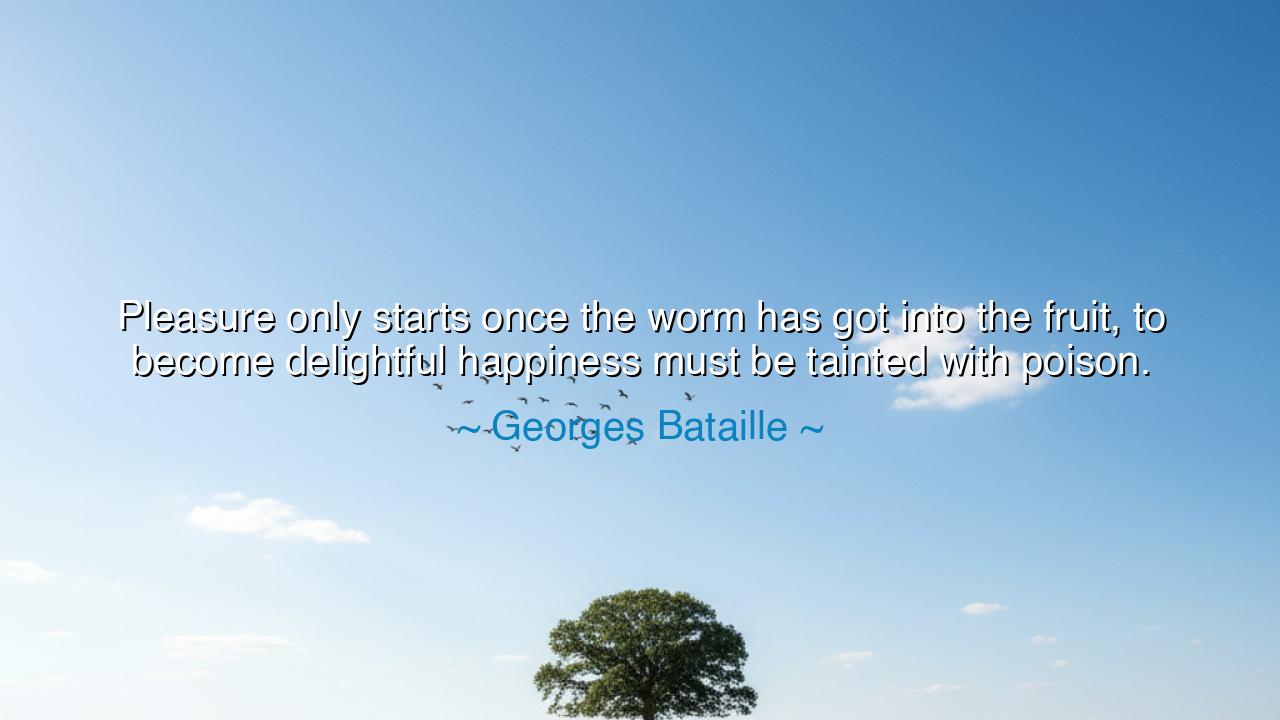
Pleasure only starts once the worm has got into the fruit, to
Pleasure only starts once the worm has got into the fruit, to become delightful happiness must be tainted with poison.






In the words of Georges Bataille, “Pleasure only starts once the worm has got into the fruit; to become delightful, happiness must be tainted with poison,” there lies a profound and unsettling truth — that pleasure and pain, happiness and decay, are bound together as night and day, each giving meaning to the other. Bataille, the philosopher of the forbidden and the sacred, understood that the sweetness of joy is sharpened by the shadow of loss, that life’s most exquisite moments are never pure, but pierced through with awareness of their fragility. In his words we find the old wisdom of the ancients: that what makes something precious is not its perfection, but its mortality.
The origin of this quote springs from Bataille’s exploration of the human condition — the tension between our yearning for transcendence and our bondage to the body. He lived through an age of turmoil and saw in human experience the mingling of ecstasy and suffering. To him, the fruit untouched by the worm — the pleasure that knows no danger, the happiness untouched by sorrow — is lifeless, without savor. It is only when the worm burrows into the fruit, when time or pain reminds us that all joy will fade, that pleasure becomes truly intense. For in that moment, our awareness of loss heightens our sense of being alive.
The ancients too spoke of this mystery. The Greeks told of Eros and Thanatos, love and death, forever intertwined. Even in their feasts and festivals, they poured a libation to Hades, acknowledging that the sweetness of life is made real by the certainty of death. In the East, the sages of India spoke of dukkha, the sorrow inherent in all things — not to condemn joy, but to remind mankind that attachment to perfection brings only suffering. Thus, from East to West, from the temples of Athens to the monasteries of Tibet, the wise have known that joy without sorrow is hollow.
Consider, for example, the story of Romeo and Juliet. Their love, pure and radiant, becomes unforgettable precisely because it is doomed. The worm of tragedy burrows deep into their happiness, and from that mingling of love and death emerges something eternal. Their joy is sweeter because it cannot last. Their sorrow is holy because it gives meaning to their passion. So it is with all human things: the poison of impermanence transforms ordinary happiness into something sublime. Without that awareness, joy would be flat — like a song without dissonance, or a dawn without night preceding it.
Bataille’s insight may trouble the comfortable heart, for he speaks against the modern illusion that happiness can be made pure and permanent. In truth, pleasure is born from contrast; happiness draws its strength from knowing how easily it can be lost. The lover treasures the beloved because he knows she may one day be gone. The artist creates feverishly because he feels time slipping through his hands. Even laughter, when it echoes in the shadow of grief, carries a note of transcendence. The worm does not destroy the fruit — it awakens its flavor.
And so, Bataille’s “poison” is not evil, but wisdom. It is the awareness of mortality, the sting of imperfection, the ache that deepens the soul. The wise do not flee from this poison; they sip it slowly, learning to savor the bitterness that makes sweetness meaningful. To live fully is to accept both the rapture and the rot, to recognize that every joy carries the seed of its own ending — and that this, rather than diminishing life, makes it sacred.
Let this be the lesson: do not seek a life without sorrow, nor pleasure without risk. Embrace the paradox that beauty and decay are one, that every beginning already holds its ending. Love with the knowledge that you will lose; create knowing that time will erase; rejoice, though the moment will not return. In doing so, your happiness will cease to be shallow — it will become profound, fierce, and true.
For in the end, as Bataille teaches, the fruit unspoiled is flavorless, but the fruit marked by life’s imperfection — bruised, bitten, alive with both sweetness and decay — holds the taste of eternity. Drink deeply of that truth, and you will discover that even in sorrow there dwells delight, and even in the shadow of death, the heart may find immortal joy.






AAdministratorAdministrator
Welcome, honored guests. Please leave a comment, we will respond soon